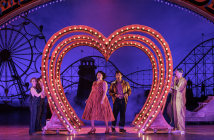Based on the 1852 play, La dame aux Camélias, adapted from the novel by Alexandre Dumas, fils, there can be few more romantic venues for Verdi’s La traviata than the sublime Teatro La Fenice in Venice, where it remains an important part of the repertoire after being first performed here in March 1853. A gilded jewel of an auditorium, lined with plush pink velvet seats and glamorous boxes, you could be forgiven for remaining oblivious to the opera house having been entirely rebuilt after a devastating fire burnt it to the ground in 1996, the third such catastrophe in its history. As testament to how much La traviata means to the company, this acclaimed production, directed by Canadian-born Robert Carsen, was the first to be staged following the reopening of the opera house in 2004, after a painstaking eight year rebuild closely copying Tommaso and Giambattista Meduna’s 1837 design and costing an estimated £42 million.
The modern day interpretation of this production also offers a nod to the fact that back in 1853 the opera house authorities prevented Verdi and his librettist, Francesco Maria Piave, giving the work a contemporary setting, and insisted that it be staged in the 1700s, something which doubtless contributed to the première of La traviata being an unmitigated disaster, especially when combined with the portly and ageing soprano, Fanny Salvini-Donatelli cast as Violetta, who failed to convince the audience that she was wasting away from consumption. Verdi wrote to a friend the following day, “La traviata last night a failure. Was the fault mine or the singers’? Time will tell.” It was not until the 1880s that the composer and librettist’s original wishes were carried out and more realistic productions were permitted, so Verdi would probably commend Patrick Kinmonth’s arrestingly 21st century sets and costumes which certainly succeed in doing away with any Victorian stuffiness in favour of evoking Paris society of today, including a strip club.

Philippe Giradeau clearly loved every moment of choreographing the opening party scene which soon paves the way to the opera’s most famous drinking song featuring the La Fenice Choir who were in full force thanks to Chorus Master Claudio Marino Moretti, and it’s surely impossible not to be delighted by the piece regardless of how many times you’ve heard it performed live in the past. This is also when we’re first introduced to the beautiful high class prostitute, Violetta Valéry (Jessica Nuccio), who appears to enjoy being surrounded by shallow party-going friends, with whom she is the centre of attention, along with flourishing the numerous bank notes she gets paid by the hour, before she is later won over by the handsome young man, Alfredo Germont (Ismael Jordi), who professes his undying love for her and shows her that a new life with him is just around the corner.
But it wouldn’t be opera if the plot was that simple, would it? And so, Alfredo’s father, Georgio Germont, (baritone Elia Fabbian who hails from nearby Castelfranco), journeys to Violetta’s home in the country, where the woodland leaves are bank notes supplied by his son, and makes an impassioned appeal to her not to continue her relationship with Alfredo because of the damaging effect it is having on his younger sister’s reputation. Not that plausible in a modern setting I grant you, but alas, the prostitute reluctantly gives Alfredo up and sacrifices her one chance of happiness in return for an easy conscience. Spanish tenor Jordi, who made his Royal Opera Covent Garden début in 2014, and where he has also performed the role of Alfredo in Richard Eyre’s acclaimed La traviata, comes into his own on losing Violetta and discovering his father’s betrayal, displaying both a vocal and acting range that makes him stand out alone whilst complimenting his leading lady.

Palermo-born Nuccio, who made her professional début at La Fenice in the role of Violetta in 2011, is meanwhile far from being a wilting damsel. A voluptuous and highly charismatic soprano, rather than coughing and spluttering her way through this three-act opera, like so many others in her profession lazily choose to do, Nuccio prefers to illustrate the heroine’s remarkable courage first, before surprising her audience with Violetta’s sudden demise in an eye-wateringly emotional finale in which she dies from tuberculosis after being reconciled with Alfredo. The fact that Nuccio and Jordi possess a strong chemistry is a vital element in the pleasure of seeing such a superb production at the Teatro La Fenice and let’s hope this revival, like the opera house itself, will never be silenced.
La Traviata at Teatro La Fenice on selected dates until 2nd July 2016. Sung in Italian with Italian and English subtitles. Running time approximately 2 hours 55 minutes including two intervals. Images by Michele Crosera. To purchase tickets or for more information on this and forthcoming productions visit the website.




